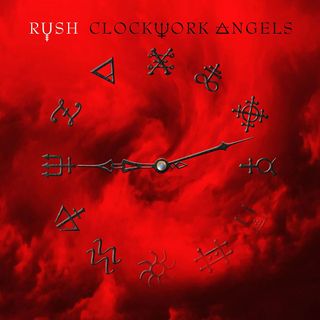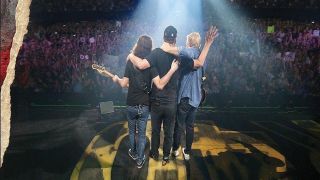"Frankly I haven't played the record to many people, so I'm very curious to see how people react to it."
Even at a remarkably vernal 58-years of age, and after a 44-year career with more peaks than troughs, Geddy Lee still bristles with slight nervousness when mention is made of Clockwork Angels, Rush's 20th (if you count 2004's Feedback EP) studio album, their first for five years and one of the most eagerly awaited albums in the band's career.
Of course Lee has nothing to worry about. Clockwork Angels is an album that, as we will discover, has not only made three middle-aged men from Canada very happy, it will also delight their worldwide fanbase, most likely beyond expectations. For starters, it's a concept album - the band's first, despite the fact illustrious past works such as Fountain Of Lamneth, 2112 and Cygnus X-1 have long left Rush with the conceptual tag. It's something that, as Lee will admit, they spent many years deliberately avoiding.
Now, as they settle into a luxurious autumn of their career and an inner-calm clearly pervades all they do, buoyed by the renewed interest and, perhaps more importantly, a new understanding rock fans have gleaned from the excellent Beyond The Lighted Stage movie of two years ago, Rush feel emboldened enough to re-embrace their inner conceptuality.
Musically, too, they haven't sounded so energised for years - possibly since 1981's momentous Moving Pictures. Caravan, BU2B and the bombastic rock-out of Headlong Flight, most of you will know. Pounding slices of thoughtful hard rock instilled with enough motifs from the band's past to excite long-term fans, but equally fresh enough to show Rush are still progressive ever onwards. But just wait 'til you hear the soaring riffs and seductive melodies of the likes of The Garden, Seven Cities Of Gold, the title track and The Anarchist. You will, to put it bluntly, shit!
"We've been very fortunate these last few years that people tend to have appreciated what we do, but it hasn't always been that way around," laughs Lee at the very thought. "Nothing polarises people quite like Rush for some reason."

Given that Rush have been such a single-minded musical entity throughout their career, was that specific polarising trait something you ever set out to do, or at least attempt to do, even subconsciously?
It’s always been part of the reaction to Rush. There have always been people with this fanatical reaction to Rush and people who just don’t get it at all. Who are grossed out by what we do [laughs].
If you had the option of remaining like that, a polarising entity, or having been widely accepted by the mainstream, if only for a few years, what route do you think you would have chosen?
I’m not certain that’s an entirely fair question, asking someone if they’d live their life a different way. In my career maybe I’ve had some small regrets, but no giant regrets. Coulda, woulda, shoulda I think applies to all of us in our lives, but I’m not unhappy with the circuitous route our professional lives have taken. And the strange evolution of our music is fine with me. We’re still pretty happy, we love what we do and we’re very, very fortunate that there’s a number of people around the world who seem to like our jagged history.
Frankly, I haven't played the record to many people, so I'm very curious to see how people react to it."
Geddy Lee
Your career longevity seems to talk for itself as well.
Yes, it’s very gratifying. It’s not lost on us that we’ve been able to have an unusual career path. We’ve developed in this one step forward, two steps back, one step sideways, two steps forwards kind of way. That we’ve been able to maintain a successful career through all that is very gratifying. We’re pretty happy working together. It’s nice when all those things work out that way.
There are nods to your past on Clockwork Angels, but they’re carried out with a delightful musical freshness. Were those reference points deliberate?
There are nods to our past but specifically when it suits the story. For example Headlong Flight is the story of our protagonist looking back over his life, so it seemed a pros pro, to do that in musical terms as well. So we looked back at some things we’d done musically in the past and put a new twist on that. And then take that just for a moment before jumping headlong off in another direction.

Mention of ‘the story’ brings us to the fact that this is a concept album. Although conceptuality and Rush seem to have forever been linked, this is your first whole concept album, isn’t it?
We did 2112 as a side, and Hemispheres has a side that almost began with the last song on the previous album. We have done concept pieces but never a full album. But there is a significant difference in that we wanted these songs not to feel like a concept album but feel like a song in itself.
On the R30 tour, you and Alex were asked by our writer Philip Wilding how much it would cost for you to make another concept piece. Neither of you seemed too keen on the idea at the time!
I think about 350,000 other people had also asked that question along the way [laughs]. Sooner or later I guess it starts to resonate with you. And again, we never set out trying to do a concept record, but this idea came to Neil and it was the idea that turned into a concept instead of looking for a concept. We’ve always tried to keep ourselves open and we’ve never tried to pre-plan our destiny, rather to see where we are at any given time. But this idea struck Neil and we all went, “Fuck it, let’s do another one.”
Are you aware, as a band, of the enormous sense of excitement the very fact that Rush are recording a concept album in 2012 instils in a large part of your fan base?
[Laughs] Not really… The concept of doing a concept album is an anxious one. Especially for me. I was so sensitive to going out there and be seen as being rooted in the past. I was so conscious of wanting to move forward. It’s a kind of sticky wicket, as you guys would say, and we wanted to make sure, by working all the way through with Neil on these lyrics, that there was a freshness and a vitality running through it.

‘Prog’ used as a derogatory, backward-looking musical term could quite rightly have been applied to Rush in the 70s, but in the last 20 years, surely people have come to view Rush as the epitome of progressive music, music that always moves on?
That’s good. That was the intent. Being progressive is what we’ve dedicated our lives to. Trying to be interesting within our hard-rock framework. Moving it. Trying to make it a bit more interesting. It’s hard to look at it objectively for me. I felt that we’d reached a happy medium in telling a story in a rock-opera style, and that’s a dangerous place to go, but telling it in a rock framework. But I think we’ve achieved that with this album.
The concept itself is intriguing. That of a watchmaker controlling the life of a central protagonist, and in itself telling the life of that central character. Is it a metaphor for God and life? Coming from atheist Peart, probably not. However, things will become more clear when the story is unfurled in a novel penned by noted fantasy author, prog fan and personal friend of Peart’s, Kevin J. Anderson. How did that collaboration come about?
This is an idea that Neil and Kevin had been tossing around. It wasn’t until we were well convinced that this would work as an album backdrop for us that they consolidated the plans for that. And of course Neil wanted to make sure everyone was happy with that.
I think it’ll be interesting. It was also a bit tricky because there’s so much Neil wants to say about the story and not all of that is appropriate on a rock album. There were times when we would say, “Look, we know that this aspect of it is really important to you but it’s going to bog the record down.” The frustration of wanting to say much more but given the limitations of lyrics and the constraints of a rock album led him to explore other ways to tell the story. And it makes a lot of sense and inspired him from a creative point of view.
The job of paring down Neil’s work into lyrical form for the album fell to you this time, did it not?
[Adopts mock Cockney accent] Well I’m the guy wot’s got to sing it, right [laughs]! I have to be totally into it and I’m writing the melodies. Neil and I have a really fantastic writer/editor relationship. He appreciates what I’m up against in terms of making it musical and being able to sing it, and we’ve developed a really great rapport in that sense and we have really great conversations back and forth with what’s working and not working, and he’s such a professional he never takes it personally. He fights for what he thinks should be in there, and likewise I’ll stick to my guns, but we always managed to work it out, and that’s what a really good working relationship is.
Do you ever think you deserve a writing credit that says: Lyrics: Peart Edited: Lee?
Ha ha ha. Lyrics left out by Lee!
The last time we spoke with Rush the Time Machine tour was about to get underway. At that point Caravan and BU2B had already been written….
So had The Garden and The Anarchist. We had a chunk of it written.
Talk back then was that the album would arrive at the end of 2010. Obviously there was a big chunk of touring in the middle, but how did we get to May 2012 and Clockwork Angels is about to come out?
Originally we planned the tour and I didn’t feel right about going out without having anything new written. Because what we like about playing live is getting our juices going playing new music on stage. We’d discussed the idea for the album and decided we’d just get at the writing. We had a great writing session and recorded those two songs very quickly. That tour was originally supposed to be only about three months long but it was going so well, and we were playing Moving Pictures as well, that it was wrong not to bring that tour to Europe and to South America as well.
It was a special show and we weren’t prepared to let it be a small tour. So we decided to put the album on pause. Alex and I had a jam session on that tour when we wrote Headlong Flight and Carnies. And when we got back off the tour and we got really close to finishing the album I rediscovered those jams and those two songs came out of them. So it’s weird that this album is made up of music that’s been written over a two-and-a-half-year period.
That must be the first time the band have ever created a record like this?
Yes it is. And it’s interesting because there’s this song on the album called Wish Them Well, and I love the lyrics and I loved the sentiment behind this song and I felt it was really important to the concept of the album. It’s about how you look at people in a non-judgemental way and I thought that was important as a part of growing up and achieving adulthood. The first two versions didn’t do the lyrics justice. So we kept rewriting it with Al and that’s the luxury of having two and a half years to work on material for a record. We got it third time lucky.
The sense of enjoyment that was palpable from the band, both when we saw you at the O2 in London, and later on the Live In Cleveland Blu-ray, seems equally evident on Clockwork Angels.
Oh we do have fun. We’re living our lives up there. We have a great fucking job and it is fun, especially when people are so into what we’re playing. They feed us and they urge us on. And it’s such an ideal situation, especially after what the different members of the band have been through over the years, not always good things, you get an appreciation, one of the few benefits of getting older, of your context and your opportunities. And we really do.

One also feels a sense of recalling your early days and the way you made your music then within the framework of these Rush songs that wouldn’t have been there 10 years ago.
I think that’s true. One of the great things of experience and success, because you get confidence from success, is that you’re relaxed enough to let your hair down and let yourself be yourself. That’s the benefit of years of making records and having crowds that appreciate your records, is that it gives you a sense of calm when you go to make your next piece of music. And you allow yourself to just be and have confidence that it is the right thing to do. When you’re younger you feel the need to prove yourself and there’s an insecurity that you’re trying to overcome.
All that plays into your performances when you’re younger. Our present sound is part of the maturing process I suppose.
That all helps when it comes to deciding that you’re going to record a concept album.
Oh yeah. It’s like, “Fuck it. Good idea. Let’s do it.” Ha ha ha.
There’s also a rumour that you might be remixing Vapor Trails and including it in a deluxe edition of Clockwork Angels…
That was an idea but it’s now been shifted down. Rather than remix the entire album we might now take a bunch of different songs from albums and get different people to remix them for fun, rather than just do Vapor Trails. It’s an idea in flux.
Tour dates for the UK have now been announced. What can we expect from Rush when you get over here in May 2013?
I just got out of a two-hour production meeting where we were discussing all those goodies right now. We’ll be bringing a new tour round, although we did kind of jump the gun with Time Machine because we were so in love with the steampunk thing and we’ll expand on that this time round. That’ll be the core of the look, we’ll just expand on it this time round.
Last time we got the whole of Moving Pictures. Are there any surprises up your sleeve akin to that for this tour you’d care to share? We hear 2112 might be getting the 5.1 treatment from Universal later this year.
We’re just putting the set-list together right now so I can’t really comment on it. We’ll have a lot of variety though, and we’ll be changing things around a bit. Obviously there’s some stalwart songs that you can’t drop without fans killing you. But we’re trying to mix it up and make it interesting.
Will this go for new pre- and post-gig movies you feature in? At the O2 in 2010, the band had long left the stage and the auditorium was still full of the audience laughing at the closing film you’d made…
It’s a lovely thing for me to look out and see our fans laughing and smiling. It’s not something you’d readily associate with a ‘heavy rock/prog rock’ show. And I think it’s a breath of fresh air that we’re allowed to flex our silly muscle and I’m glad the crowd digs it. It makes the whole evening feel like a lot more fun on a lot of different levels. And we’ve got some great ideas, we just hope people like them as much as the old ones.
This feature was first published in issue 26 of Prog Magazine.


